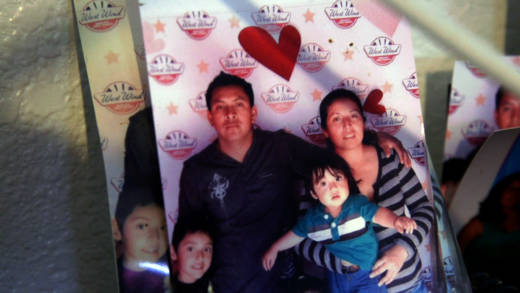That’s the case for a Guatemalan man named Maguiber, whose family lives in Oakland. His attorneys requested that KQED not publish his last name until his immigration status is resolved.
This February, before dawn one morning in Oakland, ICE agents knocked on the door of Maguiber's home, asking about a hit-and-run. He went outside to show the agents his car registration and has been detained ever since at the West County Detention Facility in Richmond. Maguiber has three children who are U.S. citizens: Kevin, 8, Gabriela, 4, and Christopher, 2.
Yibi Heras says her husband is not a criminal.
“Like all of us, he has made mistakes,” she said. “But he’s not dangerous.”
The couple's son, Kevin, has cerebral palsy and needs extra care. Heras stays home to care for him, and her two younger children. Maguiber is applying for asylum with the help of Heras and a pro bono lawyer.
"The California legislature is currently considering several initiatives that could help to mitigate the harms of immigration detention and protect Californian families," the Human Rights Watch report says. "The purpose of the analysis set forth in this paper is to provide more detailed information on immigration detention in the state, with the goal of helping prompt better, more rights-respecting reforms."
An ICE spokeswoman wrote in a statement to KQED that the agency "may consider" whether an individual is the parent of a U.S. citizen or caretaker of a minor.
"For parents who are ordered removed, it is their decision whether or not to relocate their children with them. If parents choose to have their U.S. citizen child(ren) accompany them, ICE accommodates, to the extent practicable, the parents’ efforts to make provisions for their child(ren). As practicable, ICE will coordinate to afford detained parents or legal guardians access to counsel, consulates and consular officials, courts, and/or family members in the weeks preceding removal in order to execute documents (e.g., powers of attorney, passport applications), purchase airline tickets, and make other necessary arrangements prior to travel,” she wrote.
State Legislation
Four bills moving through the state Legislature could dramatically change how immigration detention works in California.
- Senate Bill 54 would prohibit law enforcement agencies from being involved in any immigration enforcement action, bar sheriffs from contacting ICE about someone in their jail and end contracts that local municipalities have to hold immigrant detainees for ICE.
- Senate Bill 29 would phase out the contracts four California cities have with ICE to hold immigrant detainees in facilities run by private companies, hold counties and cities that house immigrant detainees in local jails to higher standards of care, make more detention records public documents and expand who could sue on behalf of immigrant detainees.
- Senate Bill 630 would prohibit counties from using state funds to expand jails that also are used to house federal prisoners, including immigrant detainees, for 10 years.
- And Senate Bill 6 would provide legal aid to anyone arrested by ICE, who is not convicted of a violent crime.
The California State Sheriffs' Association opposes three of the bills.
Spokesman Cory Salzillo said the state is overstepping its authority by attempting to regulate immigrant detention in the state. He said ICE sets the standards for immigrant detainees with local jails, and those standards are written into legally binding contracts.
Contra Costa Sheriff David Livingston is particularly concerned about SB 54. The county receives about $6 million a year from its contract with ICE to hold immigrant detainees like Maguiber.
“We think it’s a disaster,” he told KQED Newsroom prior to the release of the Human Rights Watch report.
California's Trust Act restricts sheriffs from detaining immigrants with minor crimes past their release date. SB 54 would go much further than that, Livingston said.
"It would hamper our efforts in a very demonstrable way" he said. "We couldn't share basic information about human trafficking or other cases with ICE, unless the individual has a prior conviction for a serious or violent felony. Putting those kinds of restrictions on our access to our federal colleagues and partners can be very damaging to public safety.”
Who Is Detained in California?
People are generally held in immigration detention while they await a hearing in immigration court. This population includes asylum seekers and people in deportation proceedings.
People detained in California come from all over the world, according to data from ICE.
The map below shows the number of immigration detainees held on one day in California in November 2016, by country of origin.
[detaineeMapNat]
Human Rights Watch reports that nearly half of immigrant detainees held in California had no criminal histories. And of detainees with criminal records, those convicted of relatively minor offenses — immigration offenses, drug use, possession or DUI — outnumbered by nearly 3-to-1 those convicted of violent felonies. Many of those crimes were also committed years ago. On average, the most recent conviction had occurred seven years before being detained by immigration. Statistically, immigrants are less likely to commit crime than people born in the U.S.
The vast majority of immigrants detained in California were arrested in the state or at the border, Human Rights Watch said. About 40 percent of detainees entered into the system in San Diego or at the border; and 20 percent in Los Angeles.
Opponents of SB 54 and SB 29 say that ending immigration detention in California would separate families since detainees would end up in other states.
The amount of time that immigrant detainees spent in detention varied greatly, according to the Human Rights Watch report. About 84 percent of detainees spent less than one month in detention. However, 8,298 people spent more than six months, and 1,787 more than a year in detention during the time period Human Rights Watch studied. Only one in 10 detainees were granted bond.
The majority, 55 percent, of people studied by Human Rights Watch were deported. The analysis shows that parents of U.S. citizens were more likely to be deported.
